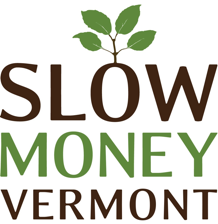This post was written by Ariella Pasackow ’18
 On December 6, Slow Money Vermont hosted its 3rd annual Entrepreneurial Showcase at the Main Street Landing Performing Art Center in Burlington. Together with the Moulton Law Group, Milk Money, Flexible Capital Fund, City Market, and other sponsors, the program brought together entrepreneurs and investors with a shared vision for local, sustainable food and farms. Slow Money Vermont “catalyzes new investment opportunities in the people, businesses and community that contribute to a sustainable food economy.” A project of the Farm to Plate Network, Slow Money Vermont is part of a national movement headquartered in Boulder, Colorado.
On December 6, Slow Money Vermont hosted its 3rd annual Entrepreneurial Showcase at the Main Street Landing Performing Art Center in Burlington. Together with the Moulton Law Group, Milk Money, Flexible Capital Fund, City Market, and other sponsors, the program brought together entrepreneurs and investors with a shared vision for local, sustainable food and farms. Slow Money Vermont “catalyzes new investment opportunities in the people, businesses and community that contribute to a sustainable food economy.” A project of the Farm to Plate Network, Slow Money Vermont is part of a national movement headquartered in Boulder, Colorado.
The Entrepreneurial Showcase presented two panels, along with opening remarks by Slow Money Vermont chair Eric DeLuca. The plenary panel was introduced by Janice St. Onge, president of Flexible Capital Fund, who discussed the life cycle of businesses and the need for a succession plan. Allison Hooper from Vermont Creamery and Bill Cherry from Switchback Brewing Company both spoke to their own exit strategies, and the challenges of thinking about selling your business before you even begin. After years of discussion and possible “suitors,” Vermont Creamery was purchased by Minnesota based Land O’Lakes in March 2017. Switchback Brewing became employee owned in February 2017, and changed their logo to reflect that decision: “Employee & Vermont Owned, Forever.” Matt Cropp from Vermont Employee Ownership Center also joined the panel to discuss broad based employee ownership programs and the ESOP model. Panelists offered advice to aspiring entrepreneurs to think about the culture that want to cultivate within their company and the legacy they want to leave behind.
Following the panel, five entrepreneurs presented a brief pitch, including an “ask” for capital and other resources, with time for questions and answers. Kimball Brook Farm, Zenbarn, Metta Earth, Kingdom View Compost at Tamerlane Farm, and Eden Specialty Ciders shared their story and plans for future growth, and showcased the diversity of businesses throughout the state. Audience members asked about the opportunities and challenges the entrepreneurs faced, and what they needed to help them succeed. Though each entrepreneur was seeking to solve very different problems, they were all committed to growing companies grounded in local, sustainable, and innovative business practices and beliefs. Additional information about the Slow Money Movement can be found here.
